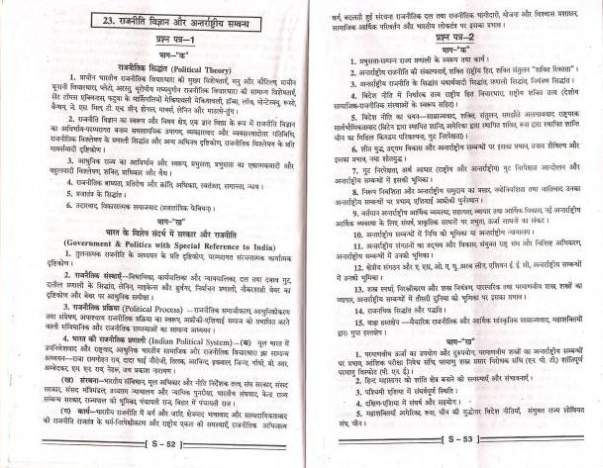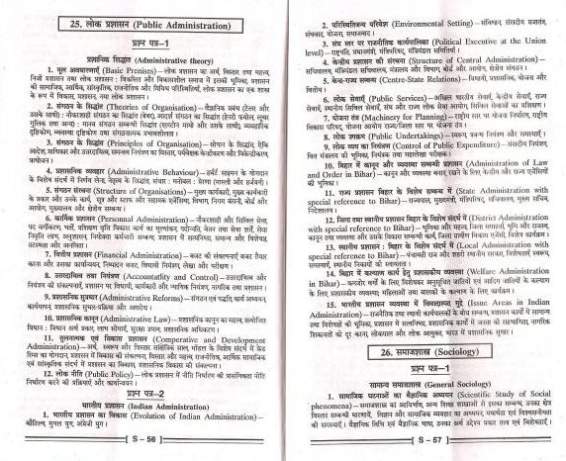here I am giving bellow Syllabus of BPSC Mains Political Science and Sociology on your demand :
Sociology Main Syllabus
Paper I
FUNDAMENTALS OF SOCIOLOGY
1. Sociology - The Discipline
Modernity and social changes in Europe and emergence of sociology.
Scope of the subject and comparison with other social sciences.
Sociology and common sense.
2. Sociology as Science:
Science, scientific method and critique.
Major theoretical strands of research methodology.
Positivism and its critique.
Fact value and objectivity.
Non- positivist methodologies.
Download FREE APP for Sociology Notes 3. Research Methods and Analysis:
Qualitative and quantitative methods.
Techniques of data collection.
Variables, sampling, hypothesis, reliability and validity.
4. Sociological Thinkers:
Karl Marx- Historical materialism, mode of production, alienation, class struggle.
Emile Durkheim- Division of labour, social fact, suicide, religion and society.
Max Weber- Social action, ideal types, authority, bureaucracy, protestant ethic and the spirit of capitalism.
Talcolt Parsons- Social system, pattern variables.
Robert K. Merton- Latent and manifest functions, conformity and deviance, reference groups.
Mead - Self and identity.
5. Stratification and Mobility:
Concepts- equality, inequality, hierarchy, exclusion, poverty and deprivation.
Theories of social stratification- Structural functionalist theory, Marxist theory, Weberian theory.
Dimensions Social stratification of class, status groups, gender, ethnicity and race.
Social mobility- open and closed systems, types of mobility, sources and causes of mobility.
6. Works and Economic Life:
Social organization of work in different types of society- slave society, feudal society, industrial /capitalist society.
Formal and informal organization of work.
Labour and society.
7. Politics and Society:
Sociological theories of power.
Power elite, bureaucracy, pressure groups, and political parties.
Nation, state, citizenship, democracy, civil society, ideology.
Protest, agitation, social movements, collective action, revolution.
8. Religion and Society:
Sociological theories of religion.
Types of religious practices: animism, monism, pluralism, sects, cults.
Religion in modern society: religion and science, secularization, religious revivalism, fundamentalism.
9. Systems of Kinship:
Family, household, marriage.
Types and forms of family.
Lineage and descent.
Patriarchy and sexual division oflabour.
Contemporary trends.
10. Social Change in Modern Society:
Sociological theories of social change.
Development and dependency.
Agents of social change.
Education and social change.
Science, technology and social change.
Paper - II: Sociology Syllabus
1 INDIAN SOCIETY: STRUCTURE AND CHANGE A. Introducing Indian Society:
(i) Perspectives on the study of Indian society:
Indology (GS. Ghurye).
Structural functionalism (M N Srinivas).
Marxist sociology (A R Desai).
(ii) Impact of colonial rule on Indian society :
Social background of Indian nationalism.
Modernization of Indian tradition.
Protests and movements during the colonial period.
Social reforms.
B. Social Structure:
(i) Rural and Agrarian Social Structure:
The idea of Indian village and village studies.
Agrarian social structure - evolution of land tenure system, land reforms.
(ii) Caste System:
Perspectives on the study of caste systems: GS Ghurye, M N Srinivas, Louis Dumont, Andre Beteille.
Features of caste system.
Untouchability - forms and perspectives.
(iii) Tribal communities in India:
Definitional problems.
Geographical spread.
Colonial policies and tribes.
Issues of integration and autonomy.
(iv) Social Classes in India:
Agrarian class structure.
Industrial class structure.
Middle classes in India.
(v) Systems of Kinship in India:
Lineage and descent in India.
Types of kinship systems.
Family and marriage in India.
Household dimensions of the family.
.
(vi) Religion and Society:
Religious communities in India.
Problems of religious minorities.
Patriarchy, entitlements and sexual division of labour
PART I
Political Theory and Indian Politics
1.Political theory meaning and approaches
2.Theories of the state: Liberal, Neoliberal, Marxist, Pluralist, Post-colonial and feminist.
3.Justice: Conceptions of justice with special reference to Rawls theory of justice and its communitarian critiques.
4.Equality: Social, political and economic;relationship between equality and freedom; Affirmative action.
5.Rights: Meaning and theories; different kinds of rights; concept of Human Rights.
6.Democracy: Classical and contemporary theories; different models of democracy - representative, participatory and deliberative.
7.Concept of power, hegemony, ideology and legitimacy.
8.Political Ideologies: Liberalism, Socialism, Marxism, Fascism, Gandhism and Feminism.
9.Indian Political Thought

haramshastra, Arthashastra and Buddhist traditions ; Sir Syed Ahmed Khan, S r i Aurobindo, M.K. Gandhi, B.R. Ambedkar, M.N. Roy .
10.Western Political Thought :Plato ,Aristotle, Machiavelli, Hobbes, Locke, John,S. Mill, Marx, Gramsci, Hannah Arendt.
Indian Government and politics syllabus
1.Indian Nationalism:
Political Strategies of Indias Freedom struggle : constitutionalism to mass Satyagraha, Non-cooperation, Civil Disobedience ; militant and revolutionary movements, Peasant and workers movements.
Perspectives on Indian National Movement: Liberal, Socialist and Marxist; Radical humanist and Dalit.
2.Making of the Indian Constitution: Legacies of the British rule; different social and political perspectives.
3.Salient Features of the Indian Constitution: The Preamble, Fundamental Rights and Duties, Directive Principles; Parliamentary System and Amendment Procedures; Judicial Review and Basic Structure doctrine.
4.
Principal Organs of the Union Government: Envisaged role and actual working of the Executive, Legislature and Supreme Court.
Principal Organs of the State Government: Envisaged role and actual working of the Executive, Legislature and High Courts.
5.Grassroots Democracy: Panchayati Raj and Municipal Government; significance of 73rd and 74th Amendments; Grassroot movements.
6.Statutory Inst i tut ions/Commissions: Election Commission, Comptroller and Auditor General, Finance Commission, Union Public Service Commission, National Commission for Scheduled Castes, National Comission for scheduled Tribes, National Commission for Women; National Human Rights Commission, National Commission for Minorities, National Backward Classes Commission.
7.Federalism: Constitutional provisions; changing nature of centre-state relations; integrationist tendencies and regional aspirations; inter-state disputes.
8.Planning and Economic Development : Nehruvian and Gandhian perspectives; role of planning and public sector; Green Revolution, land reforms and agrarian relations; liberalilzation and economic reforms.
9.Caste, Religion and Ethnicity in Indian Politics.
10.Party System: National and regional political parties, ideological and social bases of parties; patterns of coalition politics; Pressure groups, trends in electoral behaviour; changing socio- economic profile of Legislators.
11.Social Movements: Civil liberties and human rights movements; women's movements; environmentalist movements
PART II
Comparative Politics and International Relations
1. Comparative Politics: Nature and major approaches; political economy and political sociology perspectives; limitations of the comparative method.
2.State in comparative perspective: Characteristics and changing nature of the State in capitalist and socialist economies, and, advanced industrial and developing societies.
3. Politics of Representation and Participation: Political parties, pressure groups and social movements in advanced industrial and developing societies.
4. Globalisation: Responses from developed and developing societies.
5. Approaches to the Study of International Relations: Idealist, Realist, Marxist, Functionalist and Systems theory.
6. Key concepts in International Relations: National interest, Security and power; Balance of power and deterrence; Transnational actors and collective security; World capitalist economy and globalisation.
7. Changing International Political Order:
Rise of super powers; strategic and ideological Bipolarity, arms race and Cold War; nuclear threat;
Non-al igned movement : Aims and achievements;
Collapse of the Soviet Union; Unipolarity and American hegemony; relevance of non-alignment in the contemporary world.
8. Evolution of the International Economic System: From Brettonwoods to WTO; Socialist economies and the CMEA (Council for Mutual Economic Assistance); Third World demand for new international economic order; Globalisation of the world economy.
9. United Nations: Envisaged role and actual record; specialized UN agencies-aims and functioning; need for UN reforms.
10. Regionalisation of World Politics: EU, ASEAN, APEC, SAARC, NAFTA.
11. Contemporary Global Concerns: Democracy, human rights, environment, gender justice, terrorism, nuclear proliferation.
India and the World:
1. Indian Foreign Policy: Determinants of foreign policy; institutions of policy-making; continuity and change.
2. India's Contribution to the Non-Alignment Movement: Different phases; current role
3. India and South Asia:
Regional Co-operation: SAARC – past performance and future prospects.
South Asia as a Free Trade Area.
India's "Look East" policy.
Impediments to regional co-operation: river water disputes; illegal cross-border migration; ethnic conflicts and insurgencies; border disputes.
4. India and the Global South: Relations with Africa and Latin America; leadership role in the demand for NIEO and WTO negotiations.
5. India and the Global Centres of Power: USA, EU, Japan, China and Russia.
6. India and the UN System: Role in UN Peace-keeping; demand for Permanent Seat in the Security Council.
7. India and the Nuclear Question: Changing perceptions and policy.
8. Recent developments in Indian Foreign policy: India's position on the recent crisis in Afghanistan, Iraq and West Asia, growing relations with US and Israel; vision of a new world order.


 haramshastra, Arthashastra and Buddhist traditions ; Sir Syed Ahmed Khan, S r i Aurobindo, M.K. Gandhi, B.R. Ambedkar, M.N. Roy .
haramshastra, Arthashastra and Buddhist traditions ; Sir Syed Ahmed Khan, S r i Aurobindo, M.K. Gandhi, B.R. Ambedkar, M.N. Roy .